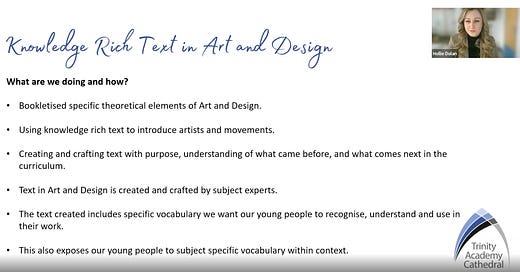I’ve been talking a great deal about the implications of the findings from the Faster Read research from the University of Sussex and how we can set high expectations accompanied by low threat
This trial found that after 12 weeks, ‘poorer’ readers overall made 16 months progress in their reading scores. Pupils with higher starting points made an impressive 8.5 months progress.
What struck me was the response from some of the pupils when they were asked about why they thought they had done so well: they said that they didn’t need to understand every word, because they could stop and talk about it if needed.
They were also keen to find out what happened next! That is because their curiosity had been sparked, and we know that this is a great driver for learning.
This is classic high challenge, low theat.
The other interesting thing was that these ‘poorer’ readers said that they didn’t normally get the chance to do this demanding work, and they relished the chance to do so. So, what is the diet for a lot of our pupils with low starting points? Well, it’s often a diet of phonics, decoding, SPAG and levelled readers. All of which are necessary, but not sufficient.
If we want to improve outcomes for all our pupils, but particularly for those who need it most, there’s a great opportunity to do this across all subjects by offering challenging material to all pupils in all subjects.
There’s some brilliant work on this at Trinity Academy Cathedral where they have developed a high-quality text curriculum across all subjects. In this Art and Design, on Myatt & Co for example, Hollie Dolan explains how curated pieces of text introduce new knowledge to the students in a structured manner. This approach is designed to encourage the creation of connections and juxtapositions between ideas, artists and movements.
Hollie also talks through the protocols that the school uses around reading aloud that have been put in place to ensure all students can access the information and vocabulary they need to make progress in their learning.
This work was led by Jennifer Webb and in this session for Myatt & Co (£/free trial) she talks about the impact of introducing high quality texts across the curriculum. As a result of this work across all subjects, standards in reading have increased significantly.
There’s more on Hollie’s approach in this conversation with Steve Willshaw for Myatt & Co. (£/free trial)
Until next time
Mary
PS Giglets are doing a spotlight webinar on 'Finding My Voice' with Rachel Higginson and me on Monday 20 January 2025 15.40-16.30. Free to register!






One of the biggest challenges for older, lower-attaining readers is that easily accessible, low-difficulty content is quite rare. If these children are given something accessible, it’s often full of content suited to younger children and it’s a massive switch-off. So, something that piques there interest is, I find, the deal-breaker.
It’s very encouraging to see results like this - and, if we can find the right content, what a difference we can make with our students.
I've always found that high-challenge, low-threat is a great way for children to learn. In my last settings, I found that children with SEN were more likely to give a challenge a go, as long as the threat of the challenge was taken away via available support.